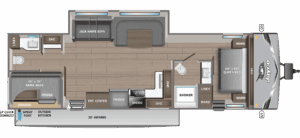When shopping for a travel trailer or fifth wheel, one of the most critical—and often overlooked—factors is understanding your tow weights. Whether you’re new to the RV lifestyle or considering an upgrade, matching the right RV to your tow vehicle is essential for safety, efficiency, and long-term enjoyment.
At All Valley RV Center, our goal is to ensure every customer hits the road confidently and safely. In this guide, we’ll explain the different types of tow weight ratings, why they matter, how to calculate safe towing limits, and how to pack smart. Let’s dive in!
What Are Tow Weights and Why Do They Matter?
When it comes to RVing, safety starts before you even leave the driveway—and that begins with understanding your tow weights. Whether you’re a first-time buyer or upgrading your RV, knowing your vehicle’s towing capacity and how it aligns with your RV is essential for safety, performance, and peace of mind on the road. Tow weight refers to the total amount of weight your vehicle can safely tow. Exceeding your vehicle’s towing limits can lead to mechanical failure, dangerous driving conditions, and voided warranties. Tow weight ratings are based on your vehicle’s engine, frame strength, suspension, and braking capabilities.
Here are the most common tow weight terms every RV shopper should know:
- GVWR (Gross Vehicle Weight Rating): The maximum total weight of your RV when fully loaded, including passengers, cargo, water, and propane.
- UVW (Unloaded Vehicle Weight): The dry weight of the RV coming straight from the manufacturer, with no gear, fluids, or passengers.
- CCC (Cargo Carrying Capacity): The amount of extra weight you can add (gear, food, water, etc.). It’s the difference between GVWR and UVW.
- GCWR (Gross Combined Weight Rating): The total maximum weight of the RV plus your tow vehicle and everything in both.
- Tongue Weight: The downward force your trailer puts on the hitch ball—typically 10–15% of the trailer’s weight.
🔗 For a detailed glossary of towing terms, visit the RV Safety & Education Foundation.
Why It Matters
Ignoring tow weights can lead to:
- Engine or transmission damage to your tow vehicle
- Poor braking and increased stopping distances
- Loss of control and sway on the road
- Voided warranties or failed roadside inspections
In short, towing beyond your vehicle’s limits isn’t just risky—it’s dangerous. At All Valley RV Center, we’ve seen too many people fall in love with an RV, only to realize their truck isn’t up to the task. That’s why we always help match the right RV with the right tow vehicle.
Real-World Example: Matching Tow Vehicle and RV
Let’s say you’re eyeing a 2026 Highland Ridge Light 275RLS (UVW: ~7,600 lbs, GVWR: 9,995 lbs). If your truck’s towing capacity is 10,000 lbs, it may seem like a match—but remember, that GVWR doesn’t include the weight of passengers, gear, or accessories in your truck.
Now add:
- 400 lbs of camping gear
- 300 lbs of passengers and pets
- 400 lbs of water (if traveling with a full tank)
You’re now over 9,000 lbs in the trailer alone, putting you dangerously close to your vehicle’s limit before even accounting for your truck’s own weight.
Common RV Add-Ons and Their Weights
Being aware of what you’re packing helps you stay within safe weight limits. Here’s a breakdown of typical RV-related gear:
| Item | Approx. Weight |
|---|---|
| Full Freshwater Tank (50 gal) | ~417 lbs |
| Propane Tanks (2 x 20 lb full) | ~40 lbs |
| Portable Generator | 100–250 lbs |
| Dual Batteries | ~130 lbs |
| Camp Chairs and Table | ~50–100 lbs |
| Grill and Outdoor Cooking Gear | ~60–80 lbs |
| Clothing and Bedding | ~100–200 lbs |
| Tools, Cords, and Hoses | ~100–150 lbs |
It adds up quickly! That’s why it’s crucial to calculate your loaded weight, not just rely on the dry weight listed in brochures.
How to Maximize and Manage Tow Weight
Here are expert tips to stay safe and make the most of your tow capacity:
✅ Know Your Tow Vehicle’s Limits
Check your owner’s manual or look up your VIN using this Towing Capacity Calculator. Never rely on guesswork—know your exact limits.
✅ Use a CAT Scale
Head to a local CAT Scale to weigh your truck, trailer, and loaded gear. This gives you a real-world snapshot of your total weight.
✅ Distribute Weight Evenly
Pack heavy items over the axles and keep both sides of the trailer balanced to reduce sway and improve braking.
✅ Lighten Up Water Weight
Travel with only as much fresh water as you need—water weighs 8.3 lbs per gallon! Fill up at your campsite if possible.
✅ Invest in a Weight Distribution Hitch
These hitches help distribute weight evenly between your trailer and vehicle axles, improving steering and stability.
Still Unsure? We Can Help!
Choosing the right RV isn’t just about features—it’s about safety. At All Valley RV Center, our knowledgeable team will:
- Help you understand your vehicle’s towing capacity
- Recommend RV models that fit your tow setup
- Provide a complete walk-through of each unit’s weight specs
- Offer towing safety checklists and gear advice
- Teach you how to use hitches, brake controllers, and sway bars
Whether you’re eyeing a lightweight travel trailer or a fifth wheel for long-term camping, we’ll make sure you’re matched up perfectly.
🔍 Explore our full inventory of travel trailers, fifth wheels, and pre-owned RVs today.
Book a Sales Appointment Today
Don’t wait until you’re on the road to find out your RV is too heavy. Let us help you shop smart—and tow safely. Our RV specialists are here 7 days a week to answer your questions, show you around, and ensure your next adventure is built on a solid foundation.
👉 Schedule a Sales Appointment or call us at (661) 269-4800.
At All Valley RV Center, we’re committed to your safety and success on the road. Let’s get you road-ready—the right way.





